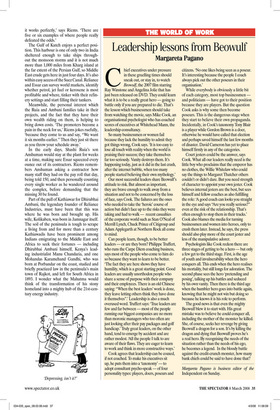Leadership lessons from Beowulf
Margareta Pagano
Chief executives under pressure in these gruelling times should sneak out, or stay in, to watch Beowulf, the 2007 film starring Ray Winstone and Angelina Jolie that has just been released on DVD. They could learn what it is to be a really great hero — going to battle only if you are prepared to die. That’s the lesson which businessmen should take from watching the movie, says Mike Cook, an organisational psychologist who has coached scores of executives at Whitehead Mann, the leadership consultancy.
So many businessmen or women fail because they lack the humility to admit they got things wrong, Cook says. ‘It is too easy to lose all touch with reality when the world is praising their success; they take themselves far too seriously. Vanity destroys them. It’s happening today, just as it did in the last crash, after the internet bubble, when too many people started believing their own mythology.’ Our most successful leaders share Beowulf’s attitude to risk. But almost as important, they are brave enough to walk away from a situation and not to be concerned by the loss of face, says Cook. The failures are the ones who needed to take the ‘heroic’ course of action but didn’t face up to the risks they were taking and had to walk — recent casualties of the corporate world such as Stan O’Neal of Merrill Lynch, Chuck Prince of Citigroup and Adam Applegarth at Northern Rock all come to mind.
Can people learn, though, to be better leaders — or are they born? Philippe Truffert, who runs the Carpe Diem coaching business, says most of the people who come to him do so because they want to learn to be better. ‘The fact they are here shows they have humility, which is a great starting point. Good leaders are usually unorthodox people who share a sense of purpose with their company and their employees. There is an old Chinese saying: “When the best leaders’ work is done, they leave letting others think they have done it themselves”.’ Leadership is also a much overused word. Truffert says: ‘True leaders are few and far between — most of the people running our biggest companies are no more than moronic managers who too often are just looking after their pay packages and golf handicap.’ Truly great leaders, on the other hand, tend to emerge by accident and are rather modest. ‘All the people I talk to are aware of their flaws. They are eager to learn to work and think in more constructive ways.’ Cook agrees that leadership can be coaxed, if not coached. To make his executives sit up, he puts them into a ‘taxonomy’ — to adopt consultant psycho-speak — of four personality types: players, doers, poseurs and citizens. ‘No one likes being seen as a poseur. It’s interesting because the people I coach always pick out the other poseurs in their organisation.’ While everybody is obviously a little bit of each category, most top businessmen — and politicians — have got to their position because they are players. But the question Cook asks is why some then become poseurs. This is the dangerous stage when they start to believe their own propaganda. Incidentally, in Cook’s taxonomy Tony Blair is a player while Gordon Brown is a doer, otherwise he would have called that election and perhaps saved himself the last few months of disaster. David Cameron has yet to place himself firmly in any of the categories.
Court jesters could be the answer, says Cook. What all our leaders really need is the little boy who proclaims that the emperor has no clothes, the Willie Whitelaw who could say the things to Margaret Thatcher others couldn’t or didn’t dare. But you need strength of character to appoint your own jester. Cook believes internal jesters are the best, but sees himself and fellow coaches as also fulfilling the role: ‘A good coach can looks you straight in the eye and says “Are you really serious?” even at the risk of the relationship. That’s often enough to stop them in their tracks.’ Cook also blames the media for turning businessmen and women into heroes, only to crush them later. Instead, he says, the press should also play more of the court jester and less of the manipulative adorer.
Psychologists like Cook reckon there are three stages of getting to be a hero — but only a few get to the third stage. First, is the age of youth and invulnerability when the hero conquers all. This ends when the hero realises his mortality, but still longs for adoration. The second phase sees the hero ‘pretending and posing’, talking up his battles and seduced by his own vanity. Then there is the third age when the humbler hero goes into battle again, knowing that he might not win but doing so because he knows it is his role to perform.
The good news is that even the mighty Beowulf blew it to start with. His great mistake was to believe he could conquer all, including the mother of the monster he killed. She, of course, seeks her revenge by giving Beowulf a dragon for a son. It’s by killing the dragon and dying that Beowulf proves he’s a real hero. By recognising the needs of the situation rather than the needs of his ego, he becomes a legend. In the bloody battle against the credit-crunch monster, how many bank chiefs could be said to have done that?
Margareta Pagano is business editor of the Independent on Sunday.


















































































 Previous page
Previous page